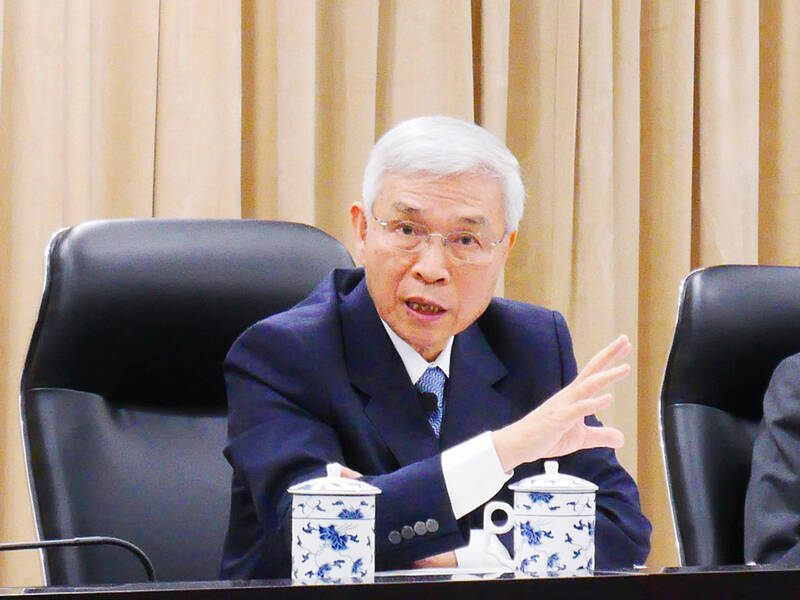Central bank Governor Yang Chin-long (楊金龍) yesterday defended the 2.6 percent return on its management of foreign exchange reserves as “prudent,” as lawmakers considered it overly conservative and proposed allocating 10 percent of the reserves to create a sovereign wealth fund to put the money to better use.
Yang made the remarks during a legislative hearing on proposals to put the central bank in charge of running a sovereign wealth fund as suggested by Taiwan People’s Party Legislator Cynthia Wu (吳欣盈) and colleagues.
“The 2.6 percent return falls in line with the central bank’s emphasis on safety and liquidity, and the yield would be 4.34 percent after factoring in compound benefits,” Yang told the hearing.

Photo: Chen Mei-ying, Taipei Times
Taiwan is the world’s fourth-largest holder of foreign exchange reserves at US$560.2 billion, behind China, Switzerland and Japan, helped by the central bank’s management skills, the monetary policymaker said.
Yang said it is unfair to compare the central bank’s management performance with sovereign wealth funds that have a greater risk appetite in pursuing returns.
The central bank is mandated to maintain stability in the local currency, the financial market and inflation, Yang said.
In line with that mandate, the central bank values safety and liquidity above other concerns as Taiwan is not a member of the IMF, which lends a helping hand when member states such as South Korea ran into solvency problems, the governor said.
Still, the central bank makes stable contributions annually, averaging 8.96 percent of overall revenue, to the national treasury, higher than Japan’s 0.66 percent, South Korea’s 1.1 percent, Switzerland’s 4.3 percent and Singapore’s 5.96 percent, Yang said.
Most central banks register uneven surpluses, because they opt for higher risks in pursuit of yields, he said.
Chinese National Party (KMT) Legislator Lo Ming-tsai (羅明才) said the central bank should have increased its gold stake and reaped a steep return of 20 percent this year.
Yang disagreed, saying that from 1989 to this year, the central bank’s gold holdings generated a return of 4.7 percent, with a volatility of 15.1 percent.
Furthermore, gold accounted for 4.81 percent of foreign exchange reserves in Taiwan, higher than China’s 4.13 percent, Japan’s 4.78 percent, Singapore’s 4.76 percent and South Korea’s 4.66 percent, Yang said.
US government bonds have proved a more robust investment tool, generating a 5.1 percent return with 4.6 percent volatility, he said.
Taiwan’s large foreign exchange reserves came from massive fund inflows induced by quantitative easing of major central banks to cope with recessions, Yang said, adding that the central bank needs sufficient reserves to keep the local currency stable in such times.

CHIP RACE: Three years of overbroad export controls drove foreign competitors to pursue their own AI chips, and ‘cost US taxpayers billions of dollars,’ Nvidia said China has figured out the US strategy for allowing it to buy Nvidia Corp’s H200s and is rejecting the artificial intelligence (AI) chip in favor of domestically developed semiconductors, White House AI adviser David Sacks said, citing news reports. US President Donald Trump on Monday said that he would allow shipments of Nvidia’s H200 chips to China, part of an administration effort backed by Sacks to challenge Chinese tech champions such as Huawei Technologies Co (華為) by bringing US competition to their home market. On Friday, Sacks signaled that he was uncertain about whether that approach would work. “They’re rejecting our chips,” Sacks

NATIONAL SECURITY: Intel’s testing of ACM tools despite US government control ‘highlights egregious gaps in US technology protection policies,’ a former official said Chipmaker Intel Corp has tested chipmaking tools this year from a toolmaker with deep roots in China and two overseas units that were targeted by US sanctions, according to two sources with direct knowledge of the matter. Intel, which fended off calls for its CEO’s resignation from US President Donald Trump in August over his alleged ties to China, got the tools from ACM Research Inc, a Fremont, California-based producer of chipmaking equipment. Two of ACM’s units, based in Shanghai and South Korea, were among a number of firms barred last year from receiving US technology over claims they have

BARRIERS: Gudeng’s chairman said it was unlikely that the US could replicate Taiwan’s science parks in Arizona, given its strict immigration policies and cultural differences Gudeng Precision Industrial Co (家登), which supplies wafer pods to the world’s major semiconductor firms, yesterday said it is in no rush to set up production in the US due to high costs. The company supplies its customers through a warehouse in Arizona jointly operated by TSS Holdings Ltd (德鑫控股), a joint holding of Gudeng and 17 Taiwanese firms in the semiconductor supply chain, including specialty plastic compounds producer Nytex Composites Co (耐特) and automated material handling system supplier Symtek Automation Asia Co (迅得). While the company has long been exploring the feasibility of setting up production in the US to address

OPTION: Uber said it could provide higher pay for batch trips, if incentives for batching is not removed entirely, as the latter would force it to pass on the costs to consumers Uber Technologies Inc yesterday warned that proposed restrictions on batching orders and minimum wages could prompt a NT$20 delivery fee increase in Taiwan, as lower efficiency would drive up costs. Uber CEO Dara Khosrowshahi made the remarks yesterday during his visit to Taiwan. He is on a multileg trip to the region, which includes stops in South Korea and Japan. His visit coincided the release last month of the Ministry of Labor’s draft bill on the delivery sector, which aims to safeguard delivery workers’ rights and improve their welfare. The ministry set the minimum pay for local food delivery drivers at